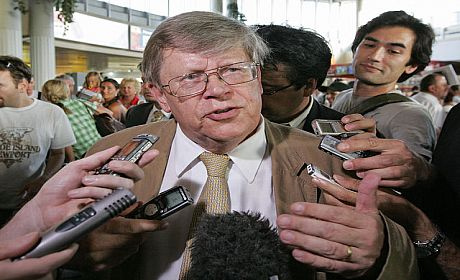Interim Agreement Not Designed For Long Term

January 26th, 2014 - by Azadeh Eftekhari
One week after the implementation of the Geneva Joint Plan of Action, all eyes are now on the next meeting between Iran and the P5+1 as a step toward reaching a final agreement. Mohammad Javad Zarif, the Iranian Foreign Minister, has said that, in his talks with Catherine Ashton, the EU’s foreign policy chief, in Davos, both sides have reached the conclusion to hold a meeting in February. However, considering the complexities of the process alongside the technical issues and expert discussions, reaching a final agreement would seem to be difficult and full of ups and downs. Iranian Diplomacy recently spoke with Olli Heinonen, a former Deputy Director-General of the International Atomic Energy Agency (IAEA), about the Geneva Agreement and steps toward a comprehensive final deal.
You've described the Geneva Agreement that is being enforced from Monday as "a step forward". Why do you think so and what are the major steps toward a final deal?
The first steps in the implementation of the interim agreement have been successfully taken. After the Chinese Spring Festival, I expect the parties to get again together some time in February and start to craft the comprehensive accord. At that time we will see parties presenting their views on the essential elements of the deal, which negotiations will likely extend to July/August.
Given the complexity in technical issues and differences to overcome, is reaching a final deal in 6 months or approximately one year a possible aim?
If there is a will, there is a way. It is going to be challenging to meet the six month goal. I see that as an important goal, since the interim agreement was not designed last long time. One should clearly avoid any notion that the interim agreement ends up being a long term agreement.
As a former deputy director-general of the IAEA, do you think that the IAEA’s authority with regard to the Geneva deal is enough for supervising the implementation of this deal? And as the IAEA’s role in this regard started from Monday, will the financial and human resources suffice?
The job of the IAEA is to verify and report the facts from the ground. The arrangements of the Joint Plan of Action fall short from those provisions enshrined into relevant UN Security Council Resolutions. I am sure that the IAEA Board of Governors approves the additional funding and other resources requested by the Secretariat.
In case a comprehensive deal is reached, Iran wants to implement the final deal in a maximum of 5 years and then become a regular member of the nuclear weapon-free community, but the US has said the deal must be enforced for at last 20 years. What is your opinion on this issue? When will the international community treat Iran like any other nuclear weapon-free country?
I would not personally put fixed time lines, but concentrate on the verification of the correctness and completeness of Iran’s declarations. This is the best way to build the confidence by Iran presenting at the same time a transparent and rationally justified nuclear program, which meets the energy and other technical needs of Iran.
The Geneva Joint Plan of Action states that Iran can continue its R&D program. What are the IAEA’s red lines in this regard?
I do not think that it is for the IAEA to set any redlines. The Joint Plan of Action is an agreement between Iran and P5+1. All interpretations on the implementation are left to the parties of the agreement. The IAEA has the task to report facts from the ground when it executes its mandates arising from the safeguards agreement, the UN Security Council resolutions, and the Joint Plan of Actions.
Late last year, Iran and the IAEA reached an agreement on expanding the access of inspectors. How do you assess the way forward in Iran-IAEA cooperation? What are the main issues?
I consider that as a minor step, since of the elements should be provided as a part of routine safeguards implementation without any additional framework agreements. Let us now see whether some more substantial items surface in the next steps when the framework is being further developed.

